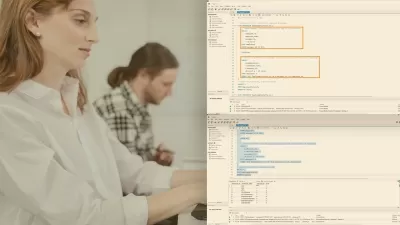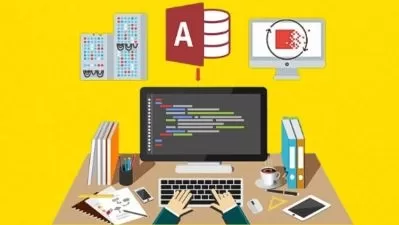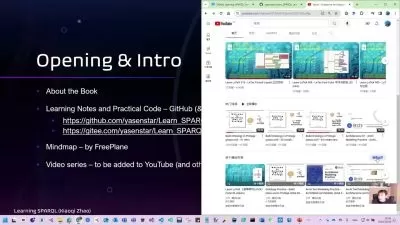Master DuckDB: The Ultimate Data Analysis Course 2024
Focused View
7:39:53
001. Chapter 1. An introduction to DuckDB.mp4
04:58
002. Chapter 1. Why should you care about DuckDB.mp4
02:27
003. Chapter 1. When should you use DuckDB.mp4
01:47
004. Chapter 1. When should you not use DuckDB.mp4
01:26
005. Chapter 1. Use cases.mp4
02:16
006. Chapter 1. Where does DuckDB fit in.mp4
01:56
007. Chapter 1. Steps of the data processing flow.mp4
08:36
008. Chapter 1. Summary.mp4
01:05
009. Chapter 2. Getting started with DuckDB.mp4
01:38
010. Chapter 2. Installing the DuckDB CLI.mp4
01:03
011. Chapter 2. Using the DuckDB CLI.mp4
03:46
012. Chapter 2. DuckDB s extension system.mp4
02:24
013. Chapter 2. Analyzing a CSV file with the DuckDB CLI.mp4
06:19
014. Chapter 2. Summary.mp4
00:46
015. Chapter 3. Executing SQL queries.mp4
03:06
016. Chapter 3. Analyzing energy production.mp4
07:02
017. Chapter 3. Data definition language queries.mp4
10:44
018. Chapter 3. Data manipulation language queries.mp4
34:00
019. Chapter 3. DuckDB-specific SQL extensions.mp4
12:44
020. Chapter 3. Summary.mp4
01:18
021. Chapter 4. Advanced aggregation and analysis of data.mp4
04:41
022. Chapter 4. Summarizing data.mp4
01:10
023. Chapter 4. On subqueries.mp4
07:28
024. Chapter 4. Grouping sets.mp4
04:36
025. Chapter 4. Window functions.mp4
15:03
026. Chapter 4. Conditions and filtering outside the WHERE clause.mp4
05:50
027. Chapter 4. The PIVOT statement.mp4
05:33
028. Chapter 4. Using the ASOF JOIN.mp4
03:52
029. Chapter 4. Using table functions.mp4
04:11
030. Chapter 4. Using LATERAL joins.mp4
05:05
031. Chapter 4. Summary.mp4
01:30
032. Chapter 5. Exploring data without persistence.mp4
03:42
033. Chapter 5. Inferring file type and schema.mp4
06:00
034. Chapter 5. Shredding nested JSON.mp4
09:31
035. Chapter 5. Translating CSV to Parquet.mp4
09:48
036. Chapter 5. Analyzing and querying Parquet files.mp4
06:25
037. Chapter 5. Querying SQLite and other databases.mp4
05:22
038. Chapter 5. Working with Excel files.mp4
02:47
039. Chapter 5. Summary.mp4
01:16
040. Chapter 6. Integrating with the Python ecosystem.mp4
05:58
041. Chapter 6. Using the relational API.mp4
18:51
042. Chapter 6. Querying pandas DataFrames.mp4
03:05
043. Chapter 6. User-defined functions.mp4
08:32
044. Chapter 6. Interoperability with Apache Arrow and Polars.mp4
05:04
045. Chapter 6. Summary.mp4
01:12
046. Chapter 7. DuckDB in the cloud with MotherDuck.mp4
06:23
047. Chapter 7. Getting started with MotherDuck.mp4
05:24
048. Chapter 7. Making the best possible use of MotherDuck.mp4
21:55
049. Chapter 7. Summary.mp4
01:11
050. Chapter 8. Building data pipelines with DuckDB.mp4
04:53
051. Chapter 8. Data ingestion with dlt.mp4
08:10
052. Chapter 8. Data transformation and modeling with dbt.mp4
13:35
053. Chapter 8. Orchestrating data pipelines with Dagster.mp4
15:30
054. Chapter 8. Summary.mp4
00:54
055. Chapter 9. Building and deploying data apps.mp4
20:26
056. Chapter 9. Building a BI dashboard with Apache Superset.mp4
14:27
057. Chapter 9. Summary.mp4
01:03
058. Chapter 10. Performance considerations for large datasets.mp4
28:49
059. Chapter 10. Query planning and execution.mp4
05:57
060. Chapter 10. Exporting the Stack Overflow data to Parquet.mp4
05:00
061. Chapter 10. Exploring the New York Taxi dataset from Parquet files.mp4
13:35
062. Chapter 10. Summary.mp4
01:16
063. Chapter 11. Conclusion.mp4
01:53
064. Chapter 11. Upcoming stable versions of DuckDB.mp4
00:37
065. Chapter 11. Aspects we did not cover.mp4
02:28
066. Chapter 11. Where can you learn more.mp4
00:45
067. Chapter 11. What is the future of data engineering with DuckDB.mp4
01:53
068. appendix A. Client APIs for DuckDB.mp4
05:14
069. appendix A. A word on concurrency.mp4
02:00
070. appendix A. Use cases.mp4
02:28
071. appendix A. Importing large amounts of data.mp4
01:12
072. appendix A. Using DuckDB from Java via the JDBC Driver.mp4
14:26
073. appendix A. Additional connection options.mp4
01:42
074. appendix A. Summary.mp4
00:54
More details
Course Overview
Dive into DuckDB with this comprehensive video course designed to transform you into a data analysis expert. Learn through practical examples and master this powerful analytical database system.
What You'll Learn
- Fundamentals of DuckDB and its architecture
- Advanced data analysis techniques
- Optimizing queries for maximum performance
Who This Is For
- Data analysts looking to expand their toolset
- Database professionals exploring modern solutions
- Developers needing efficient analytical processing
Key Benefits
- Hands-on experience with real-world applications
- 7.5+ hours of expert-led video instruction
- Actionable skills you can apply immediately
Curriculum Highlights
- Getting Started with DuckDB
- Core Querying Techniques
- Advanced Analytical Functions
Focused display
Category
- language english
- Training sessions 74
- duration 7:39:53
- Release Date 2025/05/26







